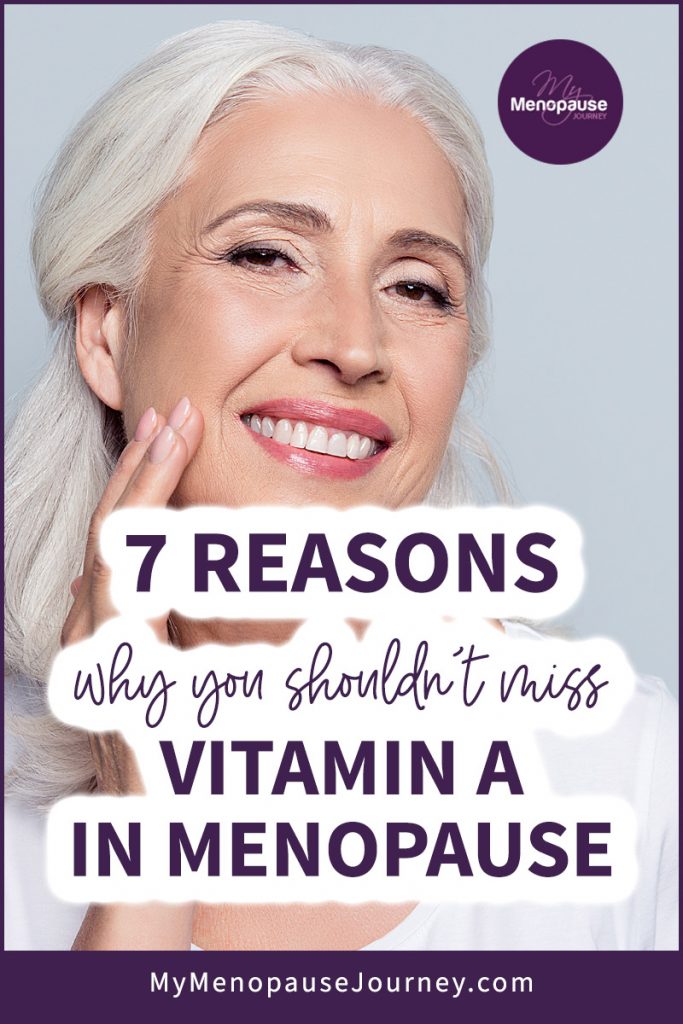When we hear about vitamin A, the first thing that usually comes into our mind is “remedy for poor vision”. Little did we know that vitamin A can also ease numerous symptoms related to menopause! PLUS, it offers a wide range of health benefits for us midlife women, more than our eyes could see! ?
Vitamin A promotes skin health, delays aging, improves vision, repairs tissues, speeds up wound healing, supports bone health, enhances muscle growth and boosts the immune system! What more can I say? This vitamin is indeed an “ALPHA”!
Read further and learn about the health benefits you can get from vitamin A, its best natural sources, recommended daily intake as well as the symptoms of vitamin A deficiency.
Facts about Vitamin A
Vitamin A is a fat-soluble vitamin. Perhaps, you already heard this a million times, but what does it really mean?
Just like vitamins D, E and K, vitamin A is absorbed more effectively with the help of fats in your body. These vitamins go through the digestion process first. Once they enter your bloodstream, your body will either use them or store them in your liver and fat cells — until they are needed!


You can find vitamin A both in animal and plant sources. Vitamin A found in animal sources are called “retinoids”. They are also known as “true” vitamin A, because they can easily be absorbed and used by the body! On the other hand, vitamin A from plant sources is known as “carotenoids”. This type of vitamin A needs to undergo a process to become a true form of vitamin A. Carotenoids are often found in dark green and yellow fruits and vegetables!
Here’s one commonly asked question: “Can you overdose on vitamins?”
As for vitamin A, toxicity rarely happens. Although there is a condition called “hypervitaminosis” or “vitamin toxicity”, a simple dietary change is often the only necessary treatment for too much vitamin A intake. For this reason, it’s best to go for natural sources to prevent toxicity, as well as reduce the chances of other health risks!
“Night blindness” can be due to vitamin A deficiency. “Night blindness” happens to people who experience poor vision during nighttime or at dim places. This condition can be caused by several factors. Suppose it is caused by vitamin A deficiency. YOU ARE STILL LUCKY! It can be treated just by taking vitamin A adequately. After all, this was how vitamin A got its fame!
Now, what health benefits does vitamin A offer for women in menopause? Read on, and you’ll know!
7 Reasons Why You Shouldn’t Miss Vitamin A in Menopause
1. Promotes Skin Health and Delays Aging
Yup, vitamin A can effectively slow down aging! Studies prove that when retinol is applied topically, it showed positive results for the aged skin!
Vitamin A is also well-known for its wrinkle-eliminating properties. This can reduce age spots, fine lines and can promote the overall health of your skin!
Moreover, vitamin A can keep your body free from toxins. Its antioxidant properties help maintain moisture and prevent dryness or skin conditions we are most likely to get in menopause!
Check out our article for more skincare tips to achieve young, healthy skin in midlife!
How to Treat Dry Skin in Menopause Naturally!
2. Improves Vision and Eye Health
Vitamin A has become popular when it comes to eye health. It enables your eyes to adjust to light changes even at night! It also keeps them moist, which can prevent dry eyes and night blindness.
Retinol also ensures a healthy retina. Studies prove that vitamin A significantly cuts down the risk of cataracts, macular degeneration and glaucoma — which are all commonly associated with aging!
3. Repairs Tissues and Promotes Wound Healing
According to the University of Maryland Medical Center, vitamin A aids the reproduction of our cells, known as “cellular differentiation”. This process is an integral part of wound healing, as it involves the growth of new tissues!
Vitamin A reduces the risk of wound infection as well, because of its ability to boost our immune system. Also, it can help manage inflammation from wounds!
4. Supports Bone Health
Vitamin A has the ability to build strong bones and teeth too!
Osteoblasts (bone-building cells) and osteoclasts (bone breaking-down cells) are both strongly influenced by vitamin A! Also, studies show that vitamin A helps in the formation of “dentin”, a layer of hard material beneath the surface of the teeth!
5. Enhances Muscle Growth
Many athletes and health enthusiasts take vitamin A for muscle growth! To them, vitamin A is useful because it supports protein synthesis — an essential process for muscles to grow. Also, vitamin A is vital for the breakdown of protein during the muscle repair process!
6. Reduces Risk of Cancer
Being a powerful antioxidant, vitamin A can reduce your risk of cervical, bladder and lung cancer — as well as prostate cancer for men!
A study found that when retinol is synergized with carotenoids and vitamin D, it shows an impressive potential in inhibiting the growth of cancer cells!
7. Boosts Immunity
Vitamin A boosts your immunity against bacteria, viruses and infections! It also enhances the activity of white blood cells. This doesn’t only keep you away from getting sick, but also helps you fight and recover — even if these disease-causing agents have already entered your body!
Additionally, vitamin A’s antioxidant properties can also help fight free radicals that cause oxidative stress. Free radicals are also known to increase your risk of heart disease, cancer and other chronic diseases!
Learn more about the benefits that vitamin A can bring to your immune system in this video from Dr. Berg! [Vitamin A and Your Immune System]
Recommended Intake and Best Sources for Vitamin A
Vitamin A is commonly measured in IU or “international units”. Not until last January 2020, when the U.S. Food and Drug Administration (FDA) required manufacturers to use mcg RAE in labels, which stands for “microgram Retinol Activity Equivalents”.
According to the Food and Nutrition Board of the Institute of Medicine, the recommended intake for vitamin A is 900 mcg RAE for male adults and 700 mcg RAE for female adults.
You can find a list of food sources with vitamin A at the National Institutes of Health.
Midlife women with vitamin A deficiency can get an extra nutrient boost from supplements too! Talk it out with your doctor!
Symptoms of Vitamin A Deficiency
According to the National Institute of Health, the following are the common symptoms of vitamin A deficiency:
- Keratinization of the skin
- Night blindness
- Burning sensation or itching in the eyes
- Inflammation of eyelids
- Xerophthalmia (dryness of the conjunctiva)
- Dull, lusterless hair
- Dandruff
- Brittle nails that break easily
- Sexual discomforts
- Fatigue
- Insomnia
Have a better understanding of vitamin A deficiency through this video from Dr. Peter Osborne, an expert in alternative medicine and nutrition! [Vitamin A Deficiency – Leaky Gut, Leaky Skin, Leaky Lung, Skin inflammation, and more]
Takeaway
Vitamin A truly holds many promising benefits that can lead you to a healthier menopause journey! All you have to do is to start including the best variety of food sources in your diet! Vitamin A will do the rest of the magic — that, I promise.
We would love to hear your thoughts so feel free to add your comments below
Let´s support each other. Use the share buttons in this article, so more women can get help and feel great!
References
ods.od.nih.gov/factsheets/VitaminA-HealthProfessional/
mayoclinic.org/drugs-supplements-vitamin-a/art-20365945
drweil.com/vitamins-supplements-herbs/vitamins/facts-about-vitamin-a/
verywellhealth.com/vitamin-toxicity-4776094
organicfacts.net/health-benefits/vitamins/health-benefits-of-vitamin-a-or-retinol.html
pubmed.ncbi.nlm.nih.gov/17515510/
ncbi.nlm.nih.gov/books/NBK222318/
muscleandstrength.com/articles/5-most-important-vitamins-for-muscle-growth-recoveryy
👉 What to Do Next
Don’t go just yet — especially if you’ve been feeling off and no one’s given you real answers.
Go to the START HERE page.
It’s where things begin to feel clearer. No more second-guessing, no more sorting through conflicting advice. Just calm, honest support for where you are right now.
And if you haven’t yet, download the FREE GUIDE.
It’s quick, clear, and made to help you feel better — without having to turn your whole life upside down.


Gita is the founder of My Menopause Journey. Since 2014, she has been supporting midlife women by sharing hard-earned learnings from her own experience. To advance her knowledge, Gita puts a lot of her time and effort into understanding the broad spectrum of women’s health. She immerses in extensive research about the physical, mental and emotional aspects of menopause. Gita believes in the life-changing power of healthy, holistic living — this is where she anchors her message to all women. Learn more about her marvelous mission in About us - My Menopause Journey.






